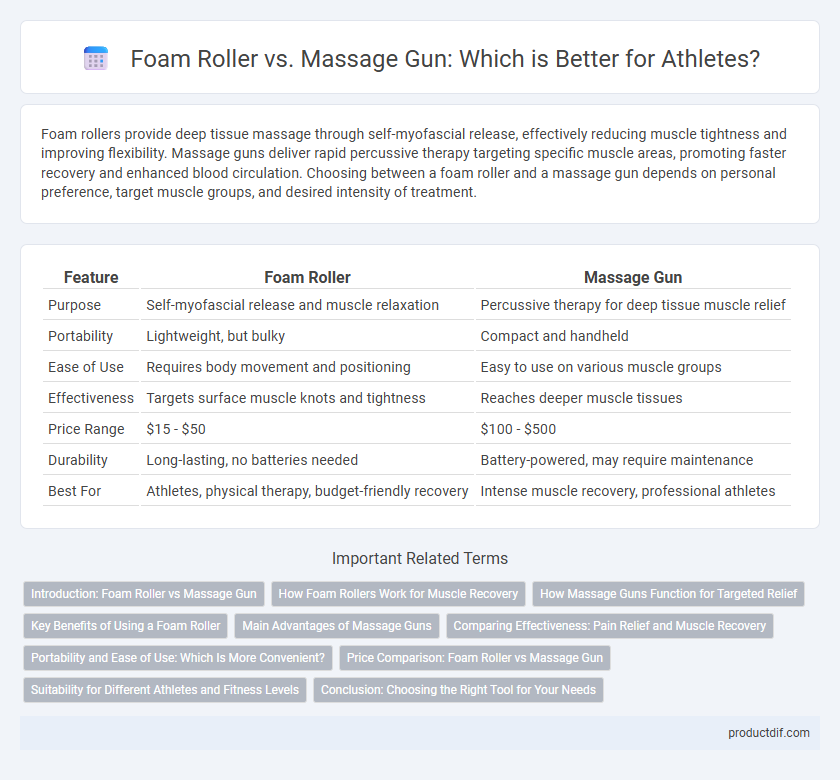Foam rollers provide deep tissue massage through self-myofascial release, effectively reducing muscle tightness and improving flexibility. Massage guns deliver rapid percussive therapy targeting specific muscle areas, promoting faster recovery and enhanced blood circulation. Choosing between a foam roller and a massage gun depends on personal preference, target muscle groups, and desired intensity of treatment.
Table of Comparison
| Feature | Foam Roller | Massage Gun |
|---|---|---|
| Purpose | Self-myofascial release and muscle relaxation | Percussive therapy for deep tissue muscle relief |
| Portability | Lightweight, but bulky | Compact and handheld |
| Ease of Use | Requires body movement and positioning | Easy to use on various muscle groups |
| Effectiveness | Targets surface muscle knots and tightness | Reaches deeper muscle tissues |
| Price Range | $15 - $50 | $100 - $500 |
| Durability | Long-lasting, no batteries needed | Battery-powered, may require maintenance |
| Best For | Athletes, physical therapy, budget-friendly recovery | Intense muscle recovery, professional athletes |
Introduction: Foam Roller vs Massage Gun
Foam rollers and massage guns are popular tools for muscle recovery and pain relief in sports and fitness. Foam rollers use self-myofascial release techniques to improve flexibility and reduce muscle soreness by applying sustained pressure to soft tissues. Massage guns deliver percussive therapy with rapid pulses to increase blood flow and alleviate muscle tension more quickly.
How Foam Rollers Work for Muscle Recovery
Foam rollers use self-myofascial release to apply pressure to muscles, promoting blood circulation and breaking up adhesions in the fascia. This increased blood flow helps reduce muscle soreness and accelerates tissue repair after exercise. Consistent foam rolling enhances flexibility and decreases recovery time by loosening tight muscles and improving overall mobility.
How Massage Guns Function for Targeted Relief
Massage guns use rapid percussive therapy to deliver deep, targeted vibrations that penetrate muscle layers, enhancing blood flow and accelerating recovery. Their adjustable speed and intensity settings allow precise control for focusing on specific muscle knots and tension points. This technology reduces muscle soreness by stimulating nerve receptors and breaking up adhesions more effectively than traditional foam rollers.
Key Benefits of Using a Foam Roller
Foam rollers provide effective myofascial release by applying sustained pressure to muscle knots, enhancing blood flow and accelerating recovery. They improve flexibility and range of motion by loosening tight muscles and fascia, reducing the risk of injury during workouts. Foam rollers are cost-effective, low-maintenance tools that offer targeted relief and can be used independently without requiring additional power sources.
Main Advantages of Massage Guns
Massage guns provide deep tissue percussion therapy that effectively targets muscle knots and enhances blood circulation for faster recovery. They offer adjustable speed settings and interchangeable heads to customize treatment intensity and focus on specific muscle groups. Portable and easy to use, massage guns deliver powerful vibrations that increase flexibility and reduce muscle soreness after intense workouts.
Comparing Effectiveness: Pain Relief and Muscle Recovery
Foam rollers promote pain relief and muscle recovery by increasing blood flow and breaking up muscle knots through sustained pressure and myofascial release. Massage guns provide rapid percussive therapy that targets deep tissue layers, enhancing muscle relaxation and reducing soreness more quickly compared to foam rollers. Both tools effectively aid recovery, but massage guns tend to offer faster pain relief for acute muscle tightness, while foam rollers excel in improving flexibility and overall muscle condition.
Portability and Ease of Use: Which Is More Convenient?
Foam rollers are lightweight and compact, making them easy to carry in gym bags or backpacks for on-the-go muscle recovery. Massage guns offer cordless operation with ergonomic designs, allowing targeted deep tissue massage without requiring floor space. Foam rollers require simple rolling motions but may demand more space, while massage guns provide precise control through handheld use, enhancing overall convenience.
Price Comparison: Foam Roller vs Massage Gun
Foam rollers typically range from $15 to $50, offering an affordable option for muscle recovery and myofascial release. Massage guns, however, are priced between $100 and $400, reflecting advanced technology and targeted percussive therapy benefits. Budget-conscious athletes often choose foam rollers for cost-efficiency, while those seeking higher intensity treatments invest in massage guns despite the higher price point.
Suitability for Different Athletes and Fitness Levels
Foam rollers suit athletes seeking low-impact myofascial release, aiding muscle flexibility and recovery through controlled pressure, making them ideal for beginners and those with sensitive muscles. Massage guns deliver targeted percussive therapy with adjustable intensity, preferred by advanced athletes needing deep tissue relief and faster muscle recovery after intense workouts. Selecting between foam rollers and massage guns depends on individual fitness levels, injury history, and specific recovery goals to maximize effectiveness.
Conclusion: Choosing the Right Tool for Your Needs
Foam rollers offer effective self-myofascial release by targeting large muscle groups and improving flexibility through sustained pressure, making them ideal for recovery and injury prevention. Massage guns provide targeted deep tissue percussion therapy that enhances muscle relaxation and reduces soreness with adjustable intensity and precision. Selecting between a foam roller and a massage gun depends on individual preferences, the specific muscle groups being treated, and desired intensity for optimal recovery and performance.
Foam Roller vs Massage Gun Infographic

 productdif.com
productdif.com